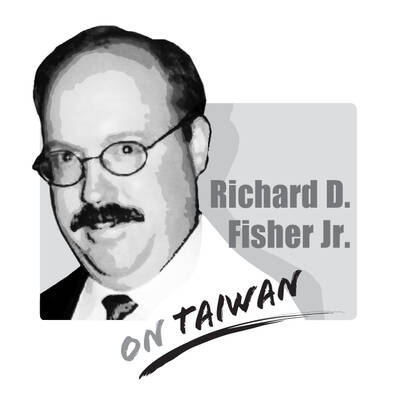Former president Lee Teng-hui's (李登輝) comment that it is unnecessary to pursue Taiwanese independence has been misunderstood and distorted by some people claim that he is giving up on independence. But Lee is actually emphasizing that Taiwan is already an independent sovereignty, and that what is important now is to improve the people's livelihoods, build national consciousness, and push for a name change and a new constitution, so that Taiwan can become a normal country.
In recent years, "Taiwan independence" theory and practice has been focused on whether a name change and a new constitution should be seen as declaration of independence, or whether Taiwan is independent, since it remains unable to enter the UN. It is indeed hard to imagine that these issues will be clarified, as there are several different interpretations of de facto and de jure independence.
The call for "Taiwanese independence" may confuse the international community, making them believe that Taiwan is a part of China. Thus, we may all be trapped by Beijing's logic that Taiwan is a part of China. Therefore, from the perspective of ensuring Taiwan's sovereignty, the discourse that the nation is already an independent state that does not have to pursue independence is undoubtedly the most feasible.
Still, we cannot ignore the fact that Taiwan is isolated internationally by China, while at the same time being hampered by the pro-unification camp and its boycotts. If the pro-independence camp ignores reality and gives an inch by looking for compromise, the pro-unification camp will take a foot. But if we face the problem squarely, unification-independence confrontation will occur, causing greater internal conflict. This is the sadness of Taiwan.
Another problem that must not be ignored is the poison left by the half-century-long colonial rule of the Chinese Nationalist Party (KMT). Consequently, any push for a name change and a new constitution would trigger fights between the two camps, proving that this is a real issue. This is why Lee deeply hurt the dark greens' feelings with the comment that the unification-independence issue was a "non-issue."
Nevertheless, the Democratic Progressive Party (DPP) has undeniably treated the "real issue" of independence/unification as a "non-issue" during its seven years in power. For example, before elections, the DPP repeatedly calls for a name change and a new constitution, repeating the "one country on each side" and "Taiwan first" slogans, but then embraces economic integration, the active opening of direct cross-strait links, and reconciliation and coexistence promoting eventual economic unification after elections, forgetting all real issues such as the KMT's stolen assets, transitional justice, name changes, a new constitution and domestic investment.
I agree with the DPP's recent move to change the names of state-run enterprises, but these moves are merely a warm-up for the 2008 presidential campaign. If these steps had been taken in 2000 or 2004, they would have received much greater support.
I believe that for the sake of Taiwan, the argument over "independence" and "real issues and non-issues" inside the pro-independence camp should end now, and pro-green supporters should instead point their guns at the same target. Externally, we have to be aware that Taiwan is already independent; internally, we have to push for a change to the nation's title, a new constitution and domestic investment.
Unification-independence conflicts are inevitable issues in this process. There is no other solution apart from facing them head-on, because there is absolutely no middle path in the pursuit of Taiwan's independence.
Huang Tien-lin is a former national policy adviser to the president.
Translated by Eddy Chang
Recently, China launched another diplomatic offensive against Taiwan, improperly linking its “one China principle” with UN General Assembly Resolution 2758 to constrain Taiwan’s diplomatic space. After Taiwan’s presidential election on Jan. 13, China persuaded Nauru to sever diplomatic ties with Taiwan. Nauru cited Resolution 2758 in its declaration of the diplomatic break. Subsequently, during the WHO Executive Board meeting that month, Beijing rallied countries including Venezuela, Zimbabwe, Belarus, Egypt, Nicaragua, Sri Lanka, Laos, Russia, Syria and Pakistan to reiterate the “one China principle” in their statements, and assert that “Resolution 2758 has settled the status of Taiwan” to hinder Taiwan’s

The bird flu outbreak at US dairy farms keeps finding alarming new ways to surprise scientists. Last week, the US Department of Agriculture (USDA) confirmed that H5N1 is spreading not just from birds to herds, but among cows. Meanwhile, media reports say that an unknown number of cows are asymptomatic. Although the risk to humans is still low, it is clear that far more work needs to be done to get a handle on the reach of the virus and how it is being transmitted. That would require the USDA and the Centers for Disease Control and Prevention (CDC) to get
As Maldivian President Mohamed Muizzu’s party won by a landslide in Sunday’s parliamentary election, it is a good time to take another look at recent developments in the Maldivian foreign policy. While Muizzu has been promoting his “Maldives First” policy, the agenda seems to have lost sight of a number of factors. Contemporary Maldivian policy serves as a stark illustration of how a blend of missteps in public posturing, populist agendas and inattentive leadership can lead to diplomatic setbacks and damage a country’s long-term foreign policy priorities. Over the past few months, Maldivian foreign policy has entangled itself in playing

For the incoming Administration of President-elect William Lai (賴清德), successfully deterring a Chinese Communist Party (CCP) attack or invasion of democratic Taiwan over his four-year term would be a clear victory. But it could also be a curse, because during those four years the CCP’s People’s Liberation Army (PLA) will grow far stronger. As such, increased vigilance in Washington and Taipei will be needed to ensure that already multiplying CCP threat trends don’t overwhelm Taiwan, the United States, and their democratic allies. One CCP attempt to overwhelm was announced on April 19, 2024, namely that the PLA had erred in combining major missions